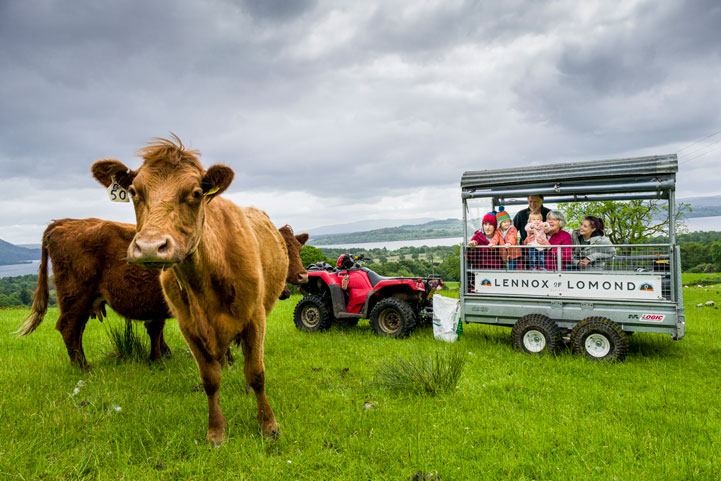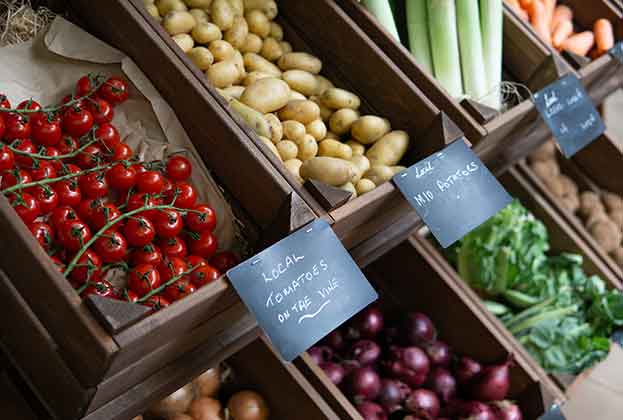These case studies demonstrate how four different but successful farm and estate diversifications have managed to utilise their assets, expertise and heritage to strengthen their traditional farming businesses.…
In all cases, much of the success and growth of the businesses can be attributed to a constant theme, vision or story that influences all decisions and is unique to the diversification.
LENNOX OF LOMOND
A working hill farm offering farm experiences and luxury accommodation

Eleven generations of the Lennox family have been farming the western shores of Loch Lomond in Scotland since 1750. The 5,000-acre tenanted hill farm is home to Bobby and Anne Lennox, their daughter Kay, her husband Dougie and their children. The family farms 1,100 sheep, 25 native cattle and has four working sheepdogs.
Today, Lennox of Lomond offers luxury lodges with hot tubs, holiday cottages and farm tours. We discuss the farm’s diversification journey with Kay starting in the 1970s when the farm employed two shepherds, a tractor driver and Kay’s grandparents. At this time, due to declining profits and the need to reduce costs, the diversification was born. The farmhouse became a bed and breakfast, which continued for 30 years. Retiring staff were not replaced with their accommodation becoming two self-catering holiday cottages.
In 2018, the family secured planning permission to build luxury self-catering lodges with hot tubs, each sleeping two adults. These Bonnie Barns, named after the islands on Loch Lomond, were designed and built by Kay’s husband. The unique finish and the personal touch has provided a point of difference and further appeal. The first lodges opened in the autumn of 2020 and, despite the interruptions caused by Covid-19, were soon fully booked. Today, there are a total of five lodges.
In 2019, the farm created an on-farm lambing experience, and the farm tours followed. In 2023, 1,000 people passed through the lambing shed. The farm also offers a “day in the life of a farmer”. These activities include learning about the farm’s history, feeding animals and seasonal activities such as watching sheepdog and shearing demonstrations and dinner in the farmhouse. “The success of the diversification is certainly helped by the farm’s breathtaking location, but the new enterprises are also intrinsically linked to the working farm via the farm experiences and the history on the farm,” says Kay. “We operate an online booking system for all our visitors, which gives us control and allows us to manage all areas of the business.”
COBBS FARM SHOP
Collaborating to supply quality food with provenance

In 2007, a passion for quality food and the growing success of the farm shop market encouraged Tom Newey and his team to develop Cobbs Farm Shop and Kitchen. Throughout the 16 years that followed, Tom has successfully developed a transferable model to buy or lease appropriate sites on farms and estates to set up farm shops and on-site dining experiences. The first farm shop, butchery and kitchen was opened in Hungerford.
Today, Cobbs has a total of five farm shops that share a consistent look and feel. The Hungerford site is described as the ultimate food destination and as well as a Cobbs play barn for children up to eight years old, there is a programme of events, including sausage-making workshops, a seasonal pumpkin patch and a Halloween open-air cinema, among others.
Redundant cattle barns are now an incredible food destination at Cobbs Farm shop and kitchen at Englefield, while in Winchester, it is within an old watercress shed. Both operate seasonal events, including coffee mornings and creative workshops. The Stratford-upon-Avon site was once a fruit farm but now includes a farm shop, café, deli, butchery and cookery school.
“As well as the financial and social benefits generated by a farm shop, farms and estates are encouraged to share in the success of the Cobbs brand by the ability to diversify without the operational risk and experience,” says Tom.
ELMORE COURT
Combining the magic of history and nature
.jpg)
Anselm Guise inherited the Elmore Court estate from his uncle in 2007. With 750 years of continuous family ownership to preserve, Anselm set to work on his vision to bring the heritage and natural environment alive across the estate, which consisted of 1,200 acres of farmland made up of six let farms, a large country house and cottages all requiring some refurbishment.
As the main house was not let and in need of restoration, Anselm’s career in the music industry presented him with the knowledge and an opportunity to create an event space and refurbish eight of the bedrooms within the house. In 2013, a wedding venue was launched. In 2016, the builders were back to refurbish a further eight bedrooms and “The Coach House”, which sleeps six. In 2018, the Victorian kitchens were converted into the perfect place for tastings and pastry-making.
Anselm’s interest in the planet and a determination to create an estate that is as self-sufficient as possible has resulted in an ethos of sustainability throughout the estate. As tenant farmers have retired, Anselm is now farming some of the land in hand and adopting regenerative principles and, where appropriate, rewilding parts of the farmland.
Anselm says: “I am very excited about Elmore Court. We have joyful gatherings and celebrations of love within the wedding venue. We have genuine nature recovery, which is now showing signs of being extraordinarily magical.” To continue the sustainable tourism journey, Anselm has recently created six new treehouses within the canopy of the woodlands and overlooking the wetlands. “Birds are flooding in, and so too are the visitors.” The powerful connection with the history of the estate, along with Anselm’s vision to connect the business activities and people to nature is creating an estate fit for the future.
UNCLE HENRY’S
From farm shop to visitor destination
.jpg)
Emma’s parents started the diversification journey back in 2006. A move back to the family’s arable and pig farm in Lincolnshire, foot and mouth, derelict buildings, combined with a desire to bring food and drink direct to the consumer saw the beginnings of Uncle Henry’s farm shop, butchery and café. Uncle Henry’s is open seven days a week and is a hub for local food and drink, stocking products from over 45 Lincolnshire producers. In 2008, the café was expanded from 45 seats to 90 seats, along with expansion of the butchery and food processing facility. The farm produces its own Lincolnshire sausages, sausage rolls, Scotch eggs, dry cure bacon and other deli products.
We talked to Emma Blandford who, after studying at Harper Adams University and working in the food sector, was able to move back to the family farm in 2014 to take on the management of the farm shop, butchery and café. Emma is keen to convey that every part of the business is linked in some way. Her brother manages the farming operation to supply the farm shop and her husband manages the energy produced from the anaerobic digestion plant, which in turn supplies the farm shop and pig unit.
Innovation and creativity is key and we are always looking at the next idea to generate further interest
Emma Blandford, Uncle Henry's
A strategy to widen the customer base and increase footfall led to the creation of a Maize Maze in 2016. A Fairy Trail was also started in the old kitchen garden, with both operating for the six weeks of the school summer holidays. The family soon realised that the business could benefit from creating seasonal attractions. “As a result, we now have an all-year-round family fun offering,” Emma explains. “Innovation and creativity are key, and we are always looking at the next idea to generate further interest. The farm shop is not surrounded by lots of houses so we need to broaden the appeal of the business. The seasonal attractions are very popular and encourage repeat visits. Plans for the future are focused on continuing to increase footfall through seasonal events and expansion of our dog-friendly activities.”
Read the articles within Spotlight: Rural Tourism and Leisure below.
.jpg)
